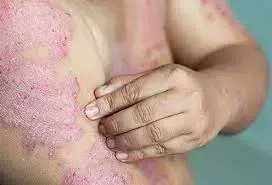- Home
- Medical news & Guidelines
- Anesthesiology
- Cardiology and CTVS
- Critical Care
- Dentistry
- Dermatology
- Diabetes and Endocrinology
- ENT
- Gastroenterology
- Medicine
- Nephrology
- Neurology
- Obstretics-Gynaecology
- Oncology
- Ophthalmology
- Orthopaedics
- Pediatrics-Neonatology
- Psychiatry
- Pulmonology
- Radiology
- Surgery
- Urology
- Laboratory Medicine
- Diet
- Nursing
- Paramedical
- Physiotherapy
- Health news
- Fact Check
- Bone Health Fact Check
- Brain Health Fact Check
- Cancer Related Fact Check
- Child Care Fact Check
- Dental and oral health fact check
- Diabetes and metabolic health fact check
- Diet and Nutrition Fact Check
- Eye and ENT Care Fact Check
- Fitness fact check
- Gut health fact check
- Heart health fact check
- Kidney health fact check
- Medical education fact check
- Men's health fact check
- Respiratory fact check
- Skin and hair care fact check
- Vaccine and Immunization fact check
- Women's health fact check
- AYUSH
- State News
- Andaman and Nicobar Islands
- Andhra Pradesh
- Arunachal Pradesh
- Assam
- Bihar
- Chandigarh
- Chattisgarh
- Dadra and Nagar Haveli
- Daman and Diu
- Delhi
- Goa
- Gujarat
- Haryana
- Himachal Pradesh
- Jammu & Kashmir
- Jharkhand
- Karnataka
- Kerala
- Ladakh
- Lakshadweep
- Madhya Pradesh
- Maharashtra
- Manipur
- Meghalaya
- Mizoram
- Nagaland
- Odisha
- Puducherry
- Punjab
- Rajasthan
- Sikkim
- Tamil Nadu
- Telangana
- Tripura
- Uttar Pradesh
- Uttrakhand
- West Bengal
- Medical Education
- Industry
Deucravacitinib beneficial in Moderate-to-Severe Plaque Psoriasis: Study

Deucravacitinib is beneficial in Moderate-to-Severe Plaque Psoriasis, according to a recent study published in the Dermatology and Therapy
Deucravacitinib is an oral, selective tyrosine kinase 2 inhibitor that demonstrated therapeutic benefit in Phase 2 clinical trial of adults with moderate to severe plaque psoriasis. This analysis was designed to evaluate the effect of deucravacitinib on additional clinical and quality-of-life (QoL) outcomes and assess the relationship between these outcomes in adults with psoriasis.
Post-hoc analysis of a 12-week Phase 2 trial was conducted for the three most efficacious dosage groups (3 mg twice daily, 6 mg twice daily, 12 mg once daily) and placebo. Investigator assessments for efficacy included Psoriasis Area and Severity Index (PASI), body surface area (BSA) involvement, and static Physician's Global Assessment; QoL was assessed using the Dermatology Life Quality Index (DLQI). Treatment responses and their associations were evaluated over time.
Results:
Deucravacitinib elicited improvement versus placebo as early as Week 4 for most efficacy measures (including changes in absolute PASI and BSA), with efficacy trends observed from Week 2 to Week 12. Improvements in QoL, assessed by the achievement of a DLQI overall score of 0/1 (no effect at all on patient's life), followed a pattern similar to deucravacitinib-related clinical outcomes over 12 weeks. Overall, patients with greater improvements in psoriasis-related clinical signs and symptoms also reported greater improvement in QoL. However, complete skin clearance was not required for achieving DLQI 0/1.
Thus, deucravacitinib treatment produced an early response and similar trends in improvements across multiple efficacy assessments and QoL in moderate to severe plaque psoriasis. Deucravacitinib has the potential to become a promising new oral therapy for this condition.
Reference:
Thaçi D, Strober B, Gordon KB, et al. Deucravacitinib in Moderate to Severe Psoriasis: Clinical and Quality-of-Life Outcomes in a Phase 2 Trial [published online ahead of print, 2022 Jan 13]. Dermatol Ther (Heidelb). 2022;10.1007/s13555-021-00649-y.
https://pubmed.ncbi.nlm.nih.gov/35025062/
Dr. Shravani Dali has completed her BDS from Pravara institute of medical sciences, loni. Following which she extensively worked in the healthcare sector for 2+ years. She has been actively involved in writing blogs in field of health and wellness. Currently she is pursuing her Masters of public health-health administration from Tata institute of social sciences. She can be contacted at editorial@medicaldialogues.in.
Dr Kamal Kant Kohli-MBBS, DTCD- a chest specialist with more than 30 years of practice and a flair for writing clinical articles, Dr Kamal Kant Kohli joined Medical Dialogues as a Chief Editor of Medical News. Besides writing articles, as an editor, he proofreads and verifies all the medical content published on Medical Dialogues including those coming from journals, studies,medical conferences,guidelines etc. Email: drkohli@medicaldialogues.in. Contact no. 011-43720751


